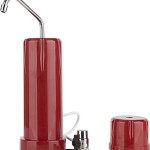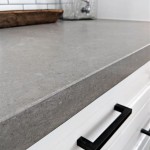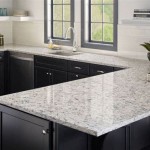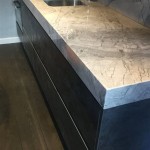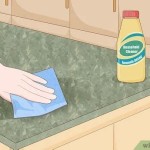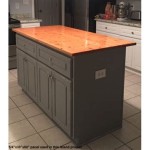How To Keep Quartz Countertops Clean: A Comprehensive Guide
Quartz countertops have become a popular choice for kitchens and bathrooms due to their durability, aesthetic appeal, and relatively low maintenance. While quartz is a non-porous material, making it resistant to stains and bacteria, proper cleaning is still essential to maintain its pristine condition and longevity. This article provides a detailed guide on how to effectively clean and maintain quartz countertops, ensuring they remain a beautiful and functional part of any home.
Understanding the composition of quartz countertops is key to selecting appropriate cleaning methods and products. Quartz countertops are engineered stones, typically composed of around 90-95% ground quartz, combined with resins, polymers, and pigments. This manufacturing process results in a surface that is significantly more durable and less porous than natural stone like granite or marble. The non-porous nature of quartz makes it highly resistant to staining from liquids, including juice, wine, oil, and coffee. However, this does not mean that quartz countertops are impervious to all substances, nor does it negate the need for regular cleaning.
Regular cleaning prevents the buildup of grime, grease, and other residues, ensuring that the countertop maintains its luster and appearance. Furthermore, certain household substances, while not necessarily causing immediate damage, can dull the surface or create a sticky film over time if not promptly removed. This guide will outline daily, weekly, and periodic cleaning strategies, as well as address specific stain removal techniques.
Daily Cleaning: Maintaining the Surface
Daily cleaning is the cornerstone of maintaining quartz countertops. This routine prevents minor spills and food debris from hardening and becoming more difficult to remove. Fortunately, the daily cleaning process for quartz is straightforward and requires only a few basic materials.
The primary tool for daily cleaning is a soft cloth or sponge. Microfiber cloths are particularly effective at lifting away dirt and grime without scratching the surface. Avoid using abrasive scrub pads or steel wool, as these can damage the finish and leave visible scratches. A gentle cleaning solution is also necessary. Dish soap diluted in warm water is usually sufficient for most daily cleaning tasks. The ratio of soap to water should be relatively low to prevent excessive suds and residue buildup.
To clean the countertop, wet the cloth or sponge with the soapy water solution and gently wipe down the entire surface. Pay particular attention to areas that have been exposed to food or spills. Rinse the cloth or sponge frequently to prevent spreading dirt around. After wiping down the surface, use a clean, dry cloth to thoroughly dry the countertop. This step is crucial to prevent water spots and streaks from forming.
For minor spills, such as a few drops of coffee or juice, prompt action is key. Immediately wipe up the spill with a clean, damp cloth. If the spill has already started to dry, use a bit of the soapy water solution to loosen the residue before wiping it away. Avoid leaving spills to sit on the countertop for extended periods.
One common mistake to avoid is using harsh chemicals or abrasive cleaners for daily cleaning. While quartz is resistant to many chemicals, prolonged exposure to highly acidic or alkaline substances can potentially damage the resin component of the countertop. Cleaners containing bleach, ammonia, or strong solvents should generally be avoided for daily use. Instead, focus on using gentle, pH-neutral cleaning solutions and implementing a consistent cleaning routine.
Weekly Cleaning: Addressing More Stubborn Residue
While daily cleaning addresses everyday spills and grime, weekly cleaning provides an opportunity to tackle more stubborn residues and maintain the overall cleanliness of the countertop. This involves a slightly more intensive cleaning process, often using a more specialized cleaning solution.
For weekly cleaning, consider using a quartz-specific cleaner. These cleaners are formulated to effectively remove grease, grime, and other residues without damaging the surface. Alternatively, a mixture of warm water and white vinegar can be used as a natural cleaning solution. The acetic acid in vinegar helps to dissolve grease and mineral buildup without being overly harsh. When using vinegar, dilute it with water in a 1:1 ratio to minimize the risk of damage to the countertop.
Apply the chosen cleaning solution to the countertop and let it sit for a few minutes to allow it to penetrate any stubborn residue. Then, use a soft cloth or sponge to scrub the surface gently. For areas with particularly stubborn stains, a slightly firmer scrubbing may be necessary, but avoid using excessive force or abrasive materials. Rinse the surface thoroughly with clean water to remove any remaining cleaning solution. Drying the countertop with a clean, dry cloth is essential to prevent water spots and streaks.
During the weekly cleaning, pay attention to areas that are frequently exposed to food preparation, such as around the sink and stovetop. These areas tend to accumulate more grease and grime. Also, check for any areas where spills may have been missed during daily cleaning. Addressing these areas during the weekly cleaning routine helps to prevent the buildup of stubborn stains.
One aspect of weekly cleaning that is often overlooked is cleaning around the edges and seams of the countertop. These areas can accumulate dust, crumbs, and other debris. Use a soft brush or a vacuum cleaner with a brush attachment to remove any debris from these areas. A damp cloth can then be used to wipe down the edges and seams.
Avoid using waxes or polishes on quartz countertops. While these products may give the countertop a temporary shine, they can also leave a sticky film that attracts dirt and grime. This film can be difficult to remove and can dull the appearance of the countertop over time. Quartz countertops are designed to maintain their shine naturally with regular cleaning, so there is no need to apply any additional polishes or waxes.
Stain Removal: Addressing Specific Challenges
Despite the non-porous nature of quartz countertops, certain substances can cause staining if left on the surface for an extended period. Addressing stains promptly and using appropriate stain removal techniques is crucial to maintaining the appearance of the countertop.
For oil-based stains, such as cooking oil or grease, a degreasing cleaner is often effective. Apply the degreasing cleaner to the stain and let it sit for a few minutes to allow it to penetrate the oil. Then, wipe away the cleaner with a clean, damp cloth. If the stain persists, repeat the process or use a slightly stronger degreasing cleaner. Avoid using abrasive cleaners, as these can scratch the surface of the countertop.
For water-based stains, such as coffee, tea, or juice, a mixture of baking soda and water can be used as a gentle abrasive cleaner. Mix the baking soda with enough water to form a paste. Apply the paste to the stain and let it sit for a few minutes. Then, gently scrub the stain with a soft cloth or sponge. Rinse the surface thoroughly with clean water and dry with a clean cloth. Baking soda is a mild abrasive that can help to lift away stains without damaging the surface of the countertop.
For more stubborn stains, such as ink or permanent marker, isopropyl alcohol (rubbing alcohol) can be used. Apply a small amount of isopropyl alcohol to a clean cloth and gently blot the stain. Avoid rubbing the stain, as this can spread it further. Continue blotting until the stain is removed. Rinse the surface thoroughly with clean water and dry with a clean cloth. Isopropyl alcohol is a solvent that can dissolve many types of stains, but it should be used sparingly to avoid damaging the countertop.
Scratches on quartz countertops are relatively rare, but they can occur if the surface is exposed to abrasive materials or sharp objects. Minor scratches can sometimes be buffed out using a quartz polishing compound. Apply the polishing compound to a soft cloth and gently rub it over the scratched area in a circular motion. Rinse the surface thoroughly with clean water and dry with a clean cloth. For deeper scratches, professional repair may be necessary. Contact a qualified countertop installer or repair specialist for assistance.
Preventing stains is always preferable to removing them. Use trivets or hot pads under hot pots and pans to prevent heat damage and staining. Use cutting boards when preparing food to avoid scratching the surface with knives or other utensils. Clean up spills immediately to prevent them from setting into the countertop. By taking these precautions, most stains can be avoided altogether.
Quartz countertops offer a blend of durability and aesthetics, making them a desirable option for modern homes. Implementing a consistent cleaning routine, including daily maintenance, weekly deep cleaning, and prompt stain removal, will preserve the beauty and functionality of quartz countertops for years to come. By understanding the nature of quartz and utilizing the proper cleaning techniques and products, homeowners can ensure that their countertops remain a focal point of their kitchens and bathrooms.

Cleaning And Caring For Quartz Countertops A Step By Guide Granite Selection

How Can You Keep Granite Countertops Shiny Gold

Cleaning And Caring For Quartz Countertops A Step By Guide Granite Selection

Are You Cleaning Quartz Countertops Wrong
.png?strip=all)
How To Protect Your Countertops All Stone Tops

How To Polish Quartz Countertops Granite 4 Less

How To Keep Quartz Countertops Clean Easylife Kitchens

How Do You Keep Quartz Countertops Clean And Shiny Flintstone Marble Granite

Gorgeous Quartz Countertops Easy Care Durable By Msi

How To Clean Quartz Countertops

